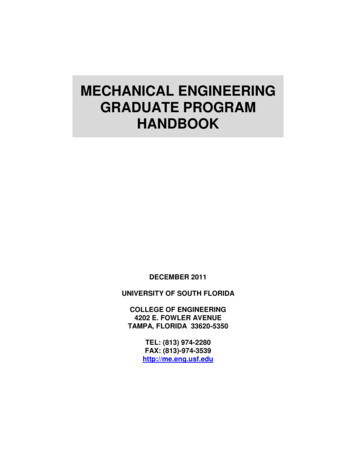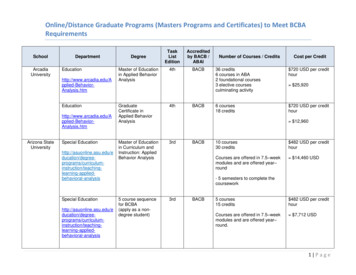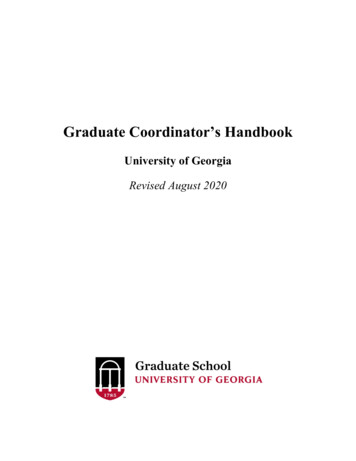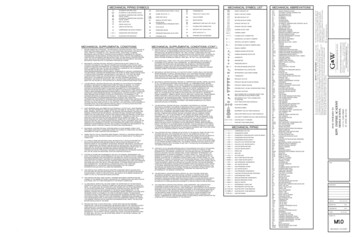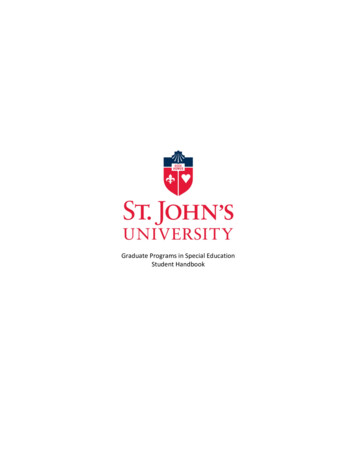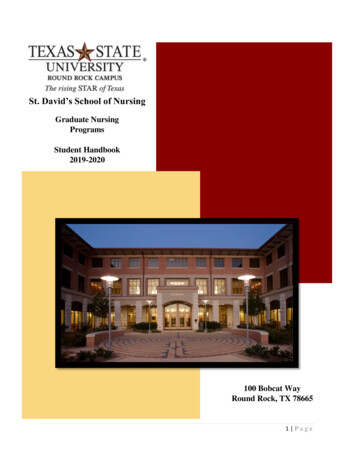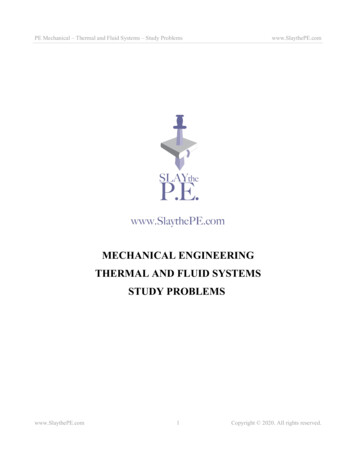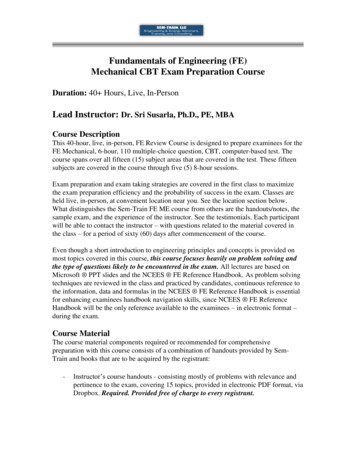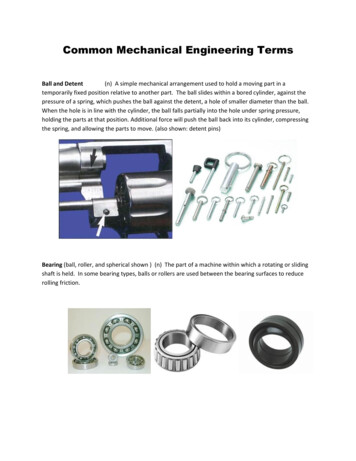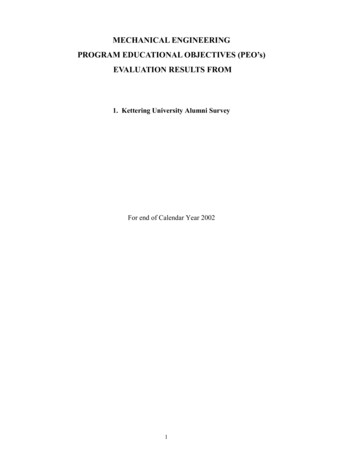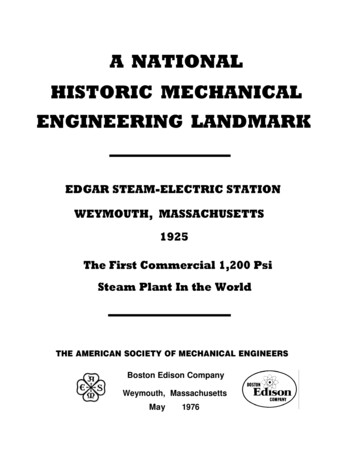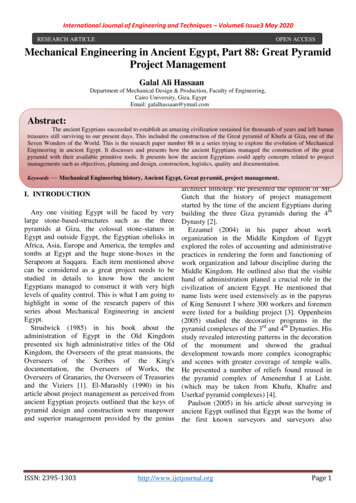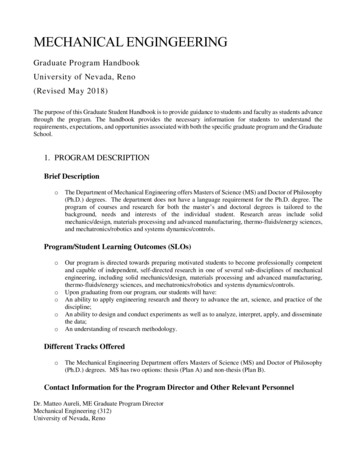
Transcription
MECHANICAL ENGINGEERINGGraduate Program HandbookUniversity of Nevada, Reno(Revised May 2018)The purpose of this Graduate Student Handbook is to provide guidance to students and faculty as students advancethrough the program. The handbook provides the necessary information for students to understand therequirements, expectations, and opportunities associated with both the specific graduate program and the GraduateSchool.1. PROGRAM DESCRIPTIONBrief DescriptionoThe Department of Mechanical Engineering offers Masters of Science (MS) and Doctor of Philosophy(Ph.D.) degrees. The department does not have a language requirement for the Ph.D. degree. Theprogram of courses and research for both the master’s and doctoral degrees is tailored to thebackground, needs and interests of the individual student. Research areas include solidmechanics/design, materials processing and advanced manufacturing, thermo-fluids/energy sciences,and mechatronics/robotics and systems dynamics/controls.Program/Student Learning Outcomes (SLOs)oooooOur program is directed towards preparing motivated students to become professionally competentand capable of independent, self-directed research in one of several sub-disciplines of mechanicalengineering, including solid mechanics/design, materials processing and advanced manufacturing,thermo-fluids/energy sciences, and mechatronics/robotics and systems dynamics/controls.Upon graduating from our program, our students will have:An ability to apply engineering research and theory to advance the art, science, and practice of thediscipline;An ability to design and conduct experiments as well as to analyze, interpret, apply, and disseminatethe data;An understanding of research methodology.Different Tracks OfferedoThe Mechanical Engineering Department offers Masters of Science (MS) and Doctor of Philosophy(Ph.D.) degrees. MS has two options: thesis (Plan A) and non-thesis (Plan B).Contact Information for the Program Director and Other Relevant PersonnelDr. Matteo Aureli, ME Graduate Program DirectorMechanical Engineering (312)University of Nevada, Reno
Reno, NV 89557Phone: 775-784-6973Fax: 775-784-1701E-mail: maureli@unr.eduNote: This handbook lists graduate program academic policies and procedures. It includes information ongraduate school policies, degree requirements, timeline for degree completion, committee selection guidelines andcomprehensive exam/thesis requirements. Every effort has been made to make this handbook accurate as of thedate of publication; however, this handbook does not constitute a contractual commitment. Graduate programsmay not offer all of the courses as described, and policies are subject to yearly review and changes with programdirector and Graduate Council approval.2. DEGREE REQUIREMENTSMasters of Science (MS) Degree in Mechanical EngineeringoBoth Plan A (requiring the completion of a thesis) and Plan B (non-thesis) master’s degree programsare available. All MS degree candidates are initially accepted into Plan B, but may be invited tocomplete Plan A in cooperation with a faculty research advisor. Graduate students in Plan A areeligible to apply for teaching assistantships. In addition to the requirements for a MS degreeestablished by the Graduate School (for details see graduate catalog), Plan A and Plan B have thefollowing requirements:Plan A12 Declaration of Advisor: Completed Declaration of Advisor Form1 must be submitted to Graduate Schoolby the end of the student’s second semester. Examination Committee (refer to Section 5 “Committee selection guideline”): Usually the Committeeconsists of three members: two (2) ME Department members and one (1) outside member. The Advisorusually serves as the Chair of the Committee. Program of Study: For MS students, the completed Program of Study Form 2 must be submitted toGraduate School by the end of the student’s third semester. Coursework:o At least 30 credits of acceptable graduate courses must be completed.o At least 21 of those credits must be earned in on-campus courses at UNR.o At least 18 credits in the program must be at the 700 level.o 6 credits can be earned by enrolling in “Thesis” ME 797.o Maximum 6 credits of ME 791 (includes independent study/research and some types of seminar) areallowed.o Any transfer credits from another institution must be recommended in the program of study by theadvisory/examining committee, and must be officially accepted by the Office of Admissions du/Documents/graduate-school/program-of-study.pdf2
Thesis Defense: A thesis and oral presentation are required. Thesis formatting guidelines can be obtainedfrom graduate school. Oral defense is taken after completion of MS work, following guidelines fromGraduate School. Typically, at the defense, there is an oral presentation (less than one hour), publicquestions, private questions with just the committee, and the committee deliberates. Often the committeerequests changes to be made to thesis before the thesis is submitted. In the case of unsatisfactorydissertation and/or final exam, the Committee can recommend termination of the student’s graduate studyor probation with further work in thesis and thesis defense. Application for Graduation: After successful thesis defense, the student fills out the Notice ofCompletion Form3 and obtains final review approval.Plan B Declaration of Advisor: Completed Declaration of Advisor Form4 must be submitted to Graduate Schoolby the end of the student’s second semester. Examination Committee (refer to Section 5 “Committee selection guideline”): Usually the Committeeconsists of three members: two (2) ME Department members and one (1) outside member. The Advisorusually serves as the Chair of the Committee. Program of Study: Completed Program of Study Form5 must be submitted to Graduate School by theend of the student’s third semester. Coursework:o At least 32 credits of acceptable graduate courses must be satisfactorily completed.o At least 23 of those credits must be earned in on-campus courses at UNR.o At least 15 credits in the program must be at the 700 level.o Maximum 6 credits of ME 791 (includes independent study/research and some types of seminars) areallowed.o Any transfer credits from another institution must be recommended in the program of study by theadvisory/examining committee, and must be officially accepted by the Office of Admissions andRecords. Comprehensive Exam: The Committee decides the format of the comprehensive exam. Usually thecomprehensive exam includes a written report and an oral presentation. The report can be a literaturereview on a specific research topic or a project determined by the Advisor. The oral presentation can berelated to the report and questioning about any topic related to coursework in program of study. In thecase of unsatisfactory comprehensive exam, the Committee can recommend termination of the student’sgraduate study or probation with further work in the report and oral presentation. Application for Graduation: A student needs to take a comprehensive exam, fill out the Notice ofCompletion form, and obtain final review approval.Doctor of Philosophy (Ph.D) Degree in Mechanical Engineering Declaration of Advisor: Completed Declaration of Advisor Form6 must be submitted to Graduate Schoolby the end of the student’s second of-Advisor.pdf43
Examination Committee (refer to Section 5 “Committee selection guideline”): The Committee is usuallychaired by the dissertation advisor and is formed before the student’s qualifying exam. Usually theCommittee consists of five members: three (3) from the ME Department and two (2) outside theDepartment. All the committee members should be Graduate Faculty at UNR or faculty members at aPhD granting program in the USA. Other people serving in the Committee require prior approvals fromUNR Graduate School with recommendation from the ME Graduate Committee. The Committeerecommends termination of the student’s PhD study or to re-take a particular exam if the student does notsatisfy required course work or a particular exam. Program of Study: For doctoral students, the completed Program of Study Form7 must be submitted toGraduate School by the end of the student’s fourth semester. Coursework: A total 72 credits are required.o Up to 24 credits can be dissertation (ME 799)o Up to 24 credits (no thesis credits) can be transferred from MS study, possibly more if GraduateSchool approves and they are at “doctoral level”.o Up to 6 credits of ME 791 are allowed (includes independent study/research and research seminars).o At most 18 credits at 600 level or at least 30 regular course credits at 700 level (excluding ME 791,ME 795, ME 799).o Usually minimum 6 regular 3-credit courses (excluding ME 791, ME 795, ME 799) are required forPhD after MS degree. Qualifying Exam: For students that have started their PhD program before Spring 2018: After majorcoursework is completed in the first or second year of PhD studies, a student registers for 1-credit courseME795 and takes the FE (Fundamentals of Engineering) exam with a minimum score of 70 in lieu ofQualifying Exam. For students that have started their PhD program in Spring 2018 or later, the new rulesof the ME PhD Qualifying exam apply. Please refer to the ME PhD Qualifying Handbook for details. Dissertation Proposal (Admission to Candidacy): The exam is taken after completion of all the coursework. The format the Dissertation Proposal is decided by the dissertation advisor and the examinationcommittee, but typically involves a presentation of past and intended work for the dissertation, followedby questions about those and related topics from the committee members. The committee should ensurethat the student has passed the necessary qualifying exams and met the GPA requirement in the corecurriculum before advancement to candidacy. The Dissertation Proposal should be completed preferablyat least one semester before intended graduation date. Dissertation Defense: A dissertation and oral presentation are required. Dissertation formattingguidelines can be obtained from graduate school. Oral defense (final exam) is taken after completion ofPhD work, following guidelines from Graduate School. Typically, at the defense, there is an oralpresentation (about one hour), public questions, private questions with just the committee, and thecommittee deliberates. Often the committee requests changes to be made to dissertation before thedissertation is submitted. Application for graduation: The student writes and defends the dissertation, files a notice of completion,obtains final review approval.3. GRADUATE COURSES OFFERED (All courses are -school/program-of-study.pdf4
oooooooooooooooooooME 610 - Introduction to System Control (3 units): Mathematics of linear systems and their control.Offered: Every FallME 614 - Intermediate Heat Transfer (3 units): Conduction, convection and radiation relationshipsare derived and applied to complex engineering problems. Offered: Every FallME 618 - Air Conditioning Engineering Systems (3 units): HVAC requirements to producethermal comfort. Use of psychrometric chart. Design of duct distribution systems. Equipmentselection. Building load calculations.ME 620 - Heat Transfer in Renewable Energy Systems (3 units): Introduction of advanced heattransfer theory and renewable energy systems. Offered: Every Spring - Odd YearsME 622 - Introduction to Robotics (3 units): Included topics are forward and inverse kinematics,motion kinematics, force/torque relations, trajectory planning, dynamics and control of robots.Offered: Every Spring.ME 631 - Advanced Mechanics (3 units): Unsymmetrical bending, shear center, strain energy,complementary energy with applications, continuous elastically supported beams, beam columns,buckling of bars, electric resistance strain gauging. Offered: Every FallME 632 - Materials (3 units): Properties of materials as they affect selection and design. Offered:every SpringME 633 - Introduction of Plasticity and Creep (3 units): Plasticity and creep theories for selectionof materials in modern design. Computer simulations and engineering applications emphasized.Offered: Every Fall - Odd YearsME 644 - Intermediate Dynamics (3 units): Kinematics and dynamics of rigid bodies in space.General theory of rotating coordinate frames, Eulers angles, Eulers equations of motion, angularmomentum, work-energy principles. Offered: Every FallME 646 - Composite Materials (3 units): Stress-strain relations of a lamina; micromechanics andmacromechanics of laminate; bending, buckling and vibration of laminated composite-material beams,plates and shells. Offered: Every FallME 653 - Mechanical Vibrations (3 units): Theory of mechanical vibrations with applications tomachinery. Includes critical speeds, torsional vibrations, isolation, damping, absorbers, uniformbeams, etc. Lectures, experiments, problems. Offered: Every SpringME 656 - Introduction to Tribology (3 units): Technological advancements in the areas of frictionand wear; surfaces and surface interactions at the micro- and nano-scales; friction and wear ofengineering materials as well as influencing factors. Offered: Every FallME 667 - Intermediate Fluid Mechanics (3 units): Fundamental topics including differential formof conservation laws, potential theory and viscous flows. Additional topics may include boundarylayer theory, turbulence, waves, surface tension. Offered: Every SpringME 674 - Active Solar Engineering (3 units): Nature and availability of solar energy. Technologyof collection and use. Design, construction and testing of solar collectors and systems. Offered: EverySpringME 675 - Introduction to Combustion (3 units): Reactive thermochemistry, mass transfer,chemically reacting systems, laminar premixed and diffusion flames, droplet and solid combustion.Offered: Every Fall - Even YearsME 676 - Internal Combustion Engines (3 units): Otto, and Sterling Diesel cycle engines and gasturbines. Thermodynamics review, combustion, ideal cycles, real engine cycles, fuels and fuelmetering, exhaust gas analysis, air pollution. Offered: Every SpringME 680 - Gas Dynamics (3 units): Fundamentals of compressible flow; one dimensional flow, shockwaves, area change, heat transfer, friction in subsonic and supersonic flow.ME 682 - Aerodynamics (3 units): Lift and drag characteristics of bodies and aerodynamicscharacteristics of the complete airplane. Offered: Every FallME 689 - Introduction to Microtechnology (3 units): Microtechnology (orMicroElectroMechanical Systems (MEMS)) is the application of traditional engineering disciplinesat the microscale. Includes material set and design of microtechnology fabrication process flows.Offered: Every Fall - Even Years5
ooooooooooooooME 691 - ASME Pressure Vessel Code for Nuclear Transport and Storage (1 unit): Guidancefor ASME Pressure Vessel Code application to nuclear transport and storage. Addresses design,fabrication, examination, and testing of package and cask to meet Code and regulatory requirements.This course offered only at Argonne National Laboratory. Students are responsible for all nationallaboratory fees and expenses associated with the course location. Offered: Every Spring.ME 692 - Quality Assurance for Transport Packaging and Storage Casks (1 unit): Developmentof QA requirements for design, procurement, fabrication, examination, and testing of radioactivematerial packaging and storage casks to satisfy regulatory requirements. This course offered only atArgonne National Laboratory. Students are responsible for all national laboratory fees and expensesassociated with the course location. Offered: Every Spring.ME 694 - Nuclear and Other Radioactive Materials Transport Security (2 units): Internationaland U.S. domestic requirements for security during the transport of nuclear and other radioactivematerials. Use of transport security plans, readiness reviews and corrective actions.This courseoffered only at Argonne National Laboratory. Students are responsible for all national laboratory feesand expenses associated with the course location. Offered: Every Fall.ME 695 - SARP Review and Confirmatory Analysis (2 units): Method for implementing andsatisfying US regulations in the safety basis of radioactive materials transport packages. This courseoffered only at Lawrence Livermore National Laboratory. Students are responsible for all nationallaboratory fees and expenses associated with the course location. Offered: Every FallME 696 - Management of SARP Preparation (1 unit): This course focuses on the development ofmanagement activities required to produce Safety Analysis Reports for Packaging (SARP). Thiscourse offered only at Savannah River National Laboratory. Students are responsible for all nationallaboratory fees and expenses associated with the course location. Offered: Every Fall and Spring.ME 697 - Radioactive Material Package Operations and Leak Testing (1 unit): Course includeradioactive material packaging activities with a focus on the safe handling and loading of radioactivematerial into approved packaging systems and formal instruction on leak testing. This course offeredonly at Savannah River National Laboratory. Students are responsible for all national laboratory feesand expenses associated with the course location. Offered: Every Fall and SpringME 701 - Advanced Mathematical Methods for Engineers (3 units): Regular and singularperturbation theory, multiple-scale analysis; asymptotic expansions with application to mechanicalsystems. Offered: Every FallME 703 - Training in Technical Presentations (1 unit S/U only): Skills, ethics and practice fortechnical presentations at meetings, conferences, and seminars. Maximum of 3 credits. Offered:Every Fall and SpringME 710 - Advanced System Dynamics and Optimal Control (3 units): State space analysis ofdeterministic, continuous systems, observability, controllability, Lyapunov functions and stabilitytheorems, the theory of optimal processes and Pontryagins maximum principle. Offered: Every FallME 720 - Continuum Mechanics (3 units): Rigorous study through tensors; topics includekinematics, stresses, strains, balance laws, constitutive equations and field equations. Offered: EverySpringME 721 - Viscoelasticity (3 units): Viscoelastic stress-strain constitutive relations, polymer behavior,elastic-viscoelastic correspondence principle, initial/boundary value problems, wave propagation,thermoviscoelasticity, creep. Offered: Every SpringME 730 - Energy and Variational Methods (3 units): Equations of mechanics, energy andvariational principles; Galerkin, Ritz and finite-element analysis of plate and shells. Offered: EverySpringME 740 - Advanced Dynamics (3 units): Fundamentals of analytical mechanics. Behavior ofdynamical systems, geometric theory. Stability of multi-degree of freedom autonomous andnonautonomous systems.ME 741 - Advanced Vibrations (3 units): Vibration of multi-degree of freedom systems withemphasis on modal analysis. Introduction to vibration of continuous systems, exact and approximatesolutions. Offered: Every Fall - Even Years6
oooooooooooooooME 745 - Mechanical Behavior of Materials (3 units): Understanding stress and strain andmechanisms of flow and fracture. Mechanical property tests including multi-axial state of stress andthe basic metal working processes. Offered: Every Fall - Even Years.ME 746 - Advanced Composite Materials (3 units): Anisotropic elasticity, shear deformationeffects; laminated plates and shells; energy methods applied to composit
University of Nevada, Reno (Revised May 2018) . o The Mechanical Engineering Department offers Masters of Science (MS) and Doctor of Philosophy (Ph.D.) degrees. MS has two options: thesis (Plan A) and non-thesis (Plan B). Contact Informat
